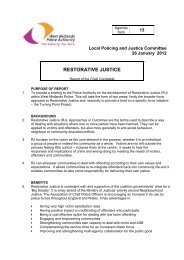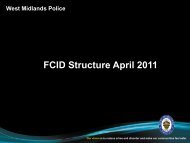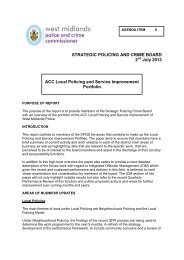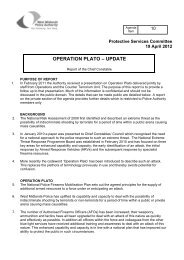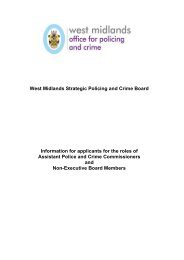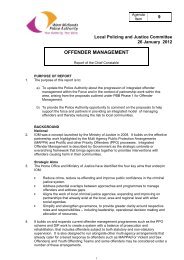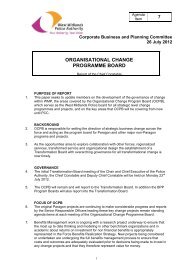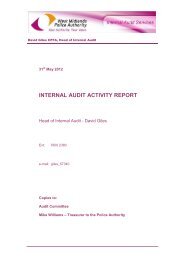WMPCC 004A 2012 Scheme of Consents and Delegations ...
WMPCC 004A 2012 Scheme of Consents and Delegations ...
WMPCC 004A 2012 Scheme of Consents and Delegations ...
Create successful ePaper yourself
Turn your PDF publications into a flip-book with our unique Google optimized e-Paper software.
West Midl<strong>and</strong>s Police Crime Commissioner<br />
<strong>Scheme</strong> <strong>of</strong> <strong>Consents</strong> <strong>and</strong> <strong>Delegations</strong><br />
22nd November <strong>2012</strong><br />
These arrangements are to have effect from 22 November <strong>2012</strong> until<br />
superseded by any subsequent scheme approved by the Police <strong>and</strong><br />
Crime Commissioner. This scheme does not take account <strong>of</strong> any<br />
transfer scheme required by Schedule 15, S10 to the Police Reform<br />
<strong>and</strong> Social Responsibility Act 2011.
<strong>Scheme</strong> <strong>of</strong> Consent 22 nd November <strong>2012</strong><br />
INDEX<br />
1. INTRODUCTION 2<br />
2. CONSENTS 4<br />
3. DELEGATIONS 8<br />
4. DEFINITIONS 9<br />
5. DELEGATIONS TO THE DEPUTY COMMISSIONER 9<br />
6. POWERS DELEGATED TO THE CHIEF EXECUTIVE 10<br />
7. POWERS DELEGATED TO THE CFO 12<br />
8. POWERS DELEGATED TO THE FORCE’S CFO 13<br />
9. POWERS DELEGATED TO THE DIRECTOR OF LEGAL SERVICES 16<br />
10. URGENCY POWER 16<br />
1
<strong>Scheme</strong> <strong>of</strong> Consent 22 nd November <strong>2012</strong><br />
1. INTRODUCTION<br />
1.1 Under the Police Reform <strong>and</strong> Social Responsibility Act 201 1 ("the Act") the West Midl<strong>and</strong>s<br />
Police Authority has been abolished <strong>and</strong> replaced with the Police <strong>and</strong> Crime Commissioner for<br />
the West Midl<strong>and</strong>s (”PCC”).<br />
1.2 This <strong>Scheme</strong> <strong>of</strong> <strong>Consents</strong> <strong>and</strong> <strong>Delegations</strong> has been prepared in accordance with the<br />
requirements <strong>of</strong> the Home Office Code <strong>of</strong> Practice on Financial Management, which is made by<br />
the Secretary <strong>of</strong> State under section 17 <strong>of</strong> the Police Reform <strong>and</strong> Social Responsibility Act<br />
2011 (the Act) <strong>and</strong> section 39A <strong>of</strong> the Police Act 1996.<br />
1.3 This <strong>Scheme</strong> <strong>of</strong> <strong>Consents</strong> <strong>and</strong> <strong>Delegations</strong> has been drawn up in consultation with the Chief<br />
Executive (“CE”), Chief Financial Officer (“CFO”), Chief Constable(“CC”) <strong>and</strong> the Force’s Chief<br />
Financial Officer (“FCFO”) <strong>and</strong> was approved <strong>and</strong> adopted by the Police <strong>and</strong> Crime<br />
Commissioner on 22 nd November <strong>2012</strong>.<br />
1.4 The primary purpose <strong>of</strong> this <strong>Scheme</strong> is to:-<br />
Set out in detail the terms on which the respective functions <strong>of</strong> the PCC <strong>and</strong> CC will be<br />
exercised, in order to comply with the Act, the Policing Protocol Order 2011 <strong>and</strong> all other<br />
legislation <strong>and</strong> achieve the objectives set out in the PCC’s Police <strong>and</strong> Crime Plan;<br />
Set out the extent <strong>and</strong> any associated conditions attaching to the PCC’s consent to the<br />
Chief Constable’s exercise <strong>of</strong> the powers to enter into contracts <strong>and</strong> acquire or dispose <strong>of</strong><br />
property;<br />
Set out the extent <strong>and</strong> details attaching to the PCC’s delegations to his own staff <strong>and</strong> those<br />
staff under the direction <strong>and</strong> control <strong>of</strong> the CC;<br />
1.5 The PCC has a number <strong>of</strong> statutory responsibilities which he/she will either discharge, directly<br />
him / herself, or via delegated/consented responsibilities, as outlined in this scheme<br />
1.6 The PCC is a corporation sole <strong>and</strong> the legal contracting body which owns all assets <strong>and</strong><br />
liabilities subject to any transfer orders as exist or may in the future be made. The PCC has<br />
responsibility for the financial administration <strong>of</strong> the PCC <strong>and</strong> West Midl<strong>and</strong>s Police (“WMP”)<br />
including all borrowing decisions.<br />
1.7 This <strong>Scheme</strong> <strong>of</strong> <strong>Consents</strong> <strong>and</strong> <strong>Delegations</strong> is intended to set out all significant decisions which<br />
are consented/delegated to senior police staff (Chief Officers) <strong>and</strong> which are <strong>of</strong> a statutory,<br />
financial or managerial nature. The scheme does not define how those decisions should be<br />
taken nor does it attempt to list all <strong>of</strong> the matters which are incidental to the exercise <strong>of</strong> those<br />
responsibilities <strong>and</strong> which are part <strong>of</strong> the everyday management functions <strong>of</strong> Chief Officers<br />
1.8 Where the PCC has appointed a Deputy Police <strong>and</strong> Crime Commissioner (DPCC) to exercise<br />
the functions <strong>of</strong> the PCC, save for those functions that cannot be delegated, the <strong>Scheme</strong> sets<br />
out those functions <strong>and</strong> decisions for which the PCC has given the DPCC delegated<br />
responsibility. This scheme also sets out those functions <strong>and</strong> decisions for which the PCC has<br />
given <strong>of</strong>ficers the delegated authority to act, pursuant to section 18 <strong>of</strong> the Act.<br />
1.9 The <strong>Scheme</strong> provides sufficient delegation to the DPCC <strong>and</strong> chief <strong>of</strong>ficers to ensure that<br />
decisions are not unnecessarily delayed, whilst ensuring that the PCC is properly protected<br />
from the risks associated with being the individual held to account for all decisions made.<br />
However it does not attempt to list all <strong>of</strong> the matters which are incidental to the exercise <strong>of</strong><br />
those responsibilities <strong>and</strong> which form part <strong>of</strong> everyday management responsibilities<br />
1.10 The <strong>Scheme</strong> is without prejudice to, <strong>and</strong> does not in any way affect, the PCC's power to<br />
make/withdraw specific delegations/consents from time to time on any powers delegated to<br />
either the staff <strong>of</strong> the PCC or persons employed by the PCC <strong>and</strong> under the direction <strong>and</strong> control<br />
2
<strong>Scheme</strong> <strong>of</strong> Consent 22 nd November <strong>2012</strong><br />
<strong>of</strong> the CC. It is a record <strong>of</strong> those formal delegations granted by the PCC which are in effect at<br />
the time <strong>of</strong> the publication <strong>of</strong> this scheme<br />
1.11 The <strong>Scheme</strong> forms part <strong>of</strong> the PCC Operating Framework (including the contract st<strong>and</strong>ing<br />
orders <strong>and</strong> financial regulations) <strong>and</strong> should be read in conjunction with the other documents as<br />
these contain further detail including the approved process for making decisions <strong>and</strong> further<br />
detailed delegations.<br />
1.12 The persons appointed as the PCC's Chief Executive (who is also the Monitoring Officer),<br />
PCC’s Chief Finance Officer (also known as the “section 151 <strong>of</strong>ficer") <strong>and</strong> the Chief Constable<br />
have statutory powers <strong>and</strong> duties inherent to their positions, <strong>and</strong> do not rely on matters being<br />
delegated to them when exercising those functions<br />
1.13 Delegation under The <strong>Scheme</strong> provides a member <strong>of</strong> the PCC’s staff with the legal power to<br />
exercise the function <strong>of</strong> the PCC. In exercising the function the member <strong>of</strong> staff must still<br />
comply with all other statutory <strong>and</strong> regulatory requirements <strong>and</strong> relevant pr<strong>of</strong>essional guidance<br />
including:<br />
The Act <strong>and</strong> other relevant legislation including all regulations issued under that Act.<br />
The Financial Regulations/Financial Instructions in operation<br />
The Home Office Financial Management Code <strong>of</strong> Practice<br />
CIPFA Statement on the role <strong>of</strong> the Chief Financial Officer in public service organisations<br />
The PCC’s St<strong>and</strong>ing Orders Relating to Contracts<br />
The PCC's governance framework<br />
The PCC’s or WMP's employment policies <strong>and</strong> procedures (whichever applicable)<br />
The Data Protection Act 1998 <strong>and</strong> the Freedom <strong>of</strong> Information Act 2000<br />
Health <strong>and</strong> Safety at work legislation <strong>and</strong> codes.<br />
1.14 For the avoidance <strong>of</strong> doubt, this <strong>Scheme</strong> does not apply to those matters which the PCC may<br />
not delegate under section 18 <strong>of</strong> the Act, as per the following list;<br />
Issuing a Police <strong>and</strong> Crime Plan<br />
Determining police <strong>and</strong> crime objectives<br />
Attendance at a meeting <strong>of</strong> the Police <strong>and</strong> Crime Panel (“PCP”)<br />
Preparing an annual report to the PCP<br />
The appointment, suspension, or the calling upon to retire or resign, <strong>of</strong> the CC<br />
Calculating a budget requirement<br />
3
<strong>Scheme</strong> <strong>of</strong> Consent 22 nd November <strong>2012</strong><br />
1.15 With the exception <strong>of</strong> those matters detailed at paragraph 1.14 The <strong>Scheme</strong> allows any person<br />
to whom a power has been delegated to sub delegate that power to a member <strong>of</strong> staff <strong>of</strong> either<br />
the PCC or a member <strong>of</strong> staff who is under the direction <strong>and</strong> control <strong>of</strong> the CC <strong>of</strong> WMP<br />
1.16 The <strong>WMPCC</strong>’s Operating Framework, including the <strong>Scheme</strong> <strong>of</strong> <strong>Consents</strong> <strong>and</strong> Delegation will<br />
be reviewed annually<br />
1.17 The PCC is held to account by the PCP. This consists <strong>of</strong> 12 Local Council members <strong>and</strong> 2<br />
Independent members. The PCP scrutinises the decisions <strong>of</strong> the PCC <strong>and</strong> is intended as a<br />
check <strong>and</strong> balance on the PCC, rather than the CC<br />
1.18 None <strong>of</strong> the consents/delegations in this <strong>Scheme</strong> constrains the PCC’s power to hold the Chief<br />
Constable to account under section 1 <strong>of</strong> the Act or require the Chief Constable to submit “a<br />
report on such matters as may be specified in the requirement, being matters connected with<br />
the policing <strong>of</strong> the area for which the force is maintained”, as provided by s.22 (3) <strong>of</strong> the Police<br />
Act 1996<br />
2. CONSENTS<br />
2.1 In exercising consents, consideration <strong>and</strong> context have to be given to the respective role <strong>of</strong> the<br />
CC, in relation to the PCC, thereby reflecting upon <strong>and</strong> demonstrating how this role, along with<br />
the agreed levels <strong>and</strong> areas <strong>of</strong> consent, outlined in this scheme, will not only assist the PCC in<br />
fulfilling his/her functions, but will also outline how the role <strong>of</strong> the CC will work in this regard,<br />
thereby enabling <strong>and</strong> facilitating the exercising <strong>of</strong> his/her own function. In this context,<br />
consideration has been given to the respective key roles <strong>of</strong> the PCC <strong>and</strong> CC as outlined below<br />
Police <strong>and</strong> Crime Commissioner<br />
Secure the maintenance <strong>of</strong> the West Midl<strong>and</strong>s police force.<br />
Secure that the West Midl<strong>and</strong>s police force is efficient <strong>and</strong> effective.<br />
Hold the Chief Constable to account on behalf <strong>of</strong> people <strong>of</strong> the West Midl<strong>and</strong>s for the<br />
exercise <strong>of</strong> the functions <strong>of</strong> Chief Constable <strong>and</strong> the functions <strong>of</strong> those under his direction<br />
<strong>and</strong> control.<br />
To be held to account by the West Midl<strong>and</strong>s Police <strong>and</strong> Crime Panel (PCP).<br />
Set the strategic direction <strong>and</strong> objectives <strong>of</strong> the West Midl<strong>and</strong>s Police (WMP) through the<br />
Police <strong>and</strong> Crime Plan, monitoring the performance <strong>of</strong> the WMP against the agreed<br />
priorities.<br />
Hold the CC to account for the duty to have regard to the Police <strong>and</strong> Crime Plan, the<br />
Strategic Policing Requirement <strong>and</strong> codes <strong>of</strong> practice issued by the Secretary <strong>of</strong> State.<br />
Hold the CC to account for the effectiveness <strong>and</strong> efficiency <strong>of</strong> his arrangements in respect<br />
to:<br />
o Section 22A <strong>of</strong> the Police Act 1996<br />
o Engaging with local people (Section 34)<br />
o Value for money (Section 35)<br />
o Safeguarding <strong>of</strong> Children <strong>and</strong> promotion <strong>of</strong> child welfare<br />
Approve the PCC /WMP budget.<br />
4
<strong>Scheme</strong> <strong>of</strong> Consent 22 nd November <strong>2012</strong><br />
Make recommendations regarding the appointment representations for the appointment <strong>of</strong><br />
Deputy Chief Constable, <strong>and</strong> to respond to consultation by the WMP on the appointments<br />
<strong>and</strong> removal <strong>of</strong> other senior police <strong>of</strong>ficers.<br />
The dismissal, suspension <strong>and</strong> removal <strong>of</strong> the CC.<br />
Hold the Chief Constable <strong>and</strong> those under his direction <strong>and</strong> control to account for the<br />
exercise <strong>of</strong> duties relating to equality <strong>and</strong> diversity.<br />
Make crime <strong>and</strong> disorder reduction grants.<br />
H<strong>and</strong>le complaints <strong>and</strong> conduct matters in relation to the Chief Constable.<br />
To be open <strong>and</strong> accountable.<br />
Chief Constable<br />
Maintaining the Queen’s Peace.<br />
Delivery <strong>of</strong> efficient <strong>and</strong> effective policing.<br />
Efficient management <strong>of</strong> resources <strong>and</strong> expenditure which delivers VFM.<br />
Having regard in that delivery to the strategic direction <strong>and</strong> objectives outlined in the Police<br />
<strong>and</strong> Crime plan, the Strategic Policing Requirement <strong>and</strong> codes <strong>of</strong> practice issued by the<br />
Secretary <strong>of</strong> State.<br />
Maintain effective <strong>and</strong> efficient arrangements in respect to:<br />
o Collaboration Agreements Section 22A <strong>of</strong> the Police Act 1996<br />
o Engaging with local people (Section 34)<br />
o Value for money (Section 35)<br />
o Safeguarding <strong>of</strong> Children <strong>and</strong> in the promotion <strong>of</strong> child welfare.<br />
Maintaining operational independence in the service <strong>of</strong> the public.<br />
Impartial direction <strong>and</strong> control <strong>of</strong> all constables <strong>and</strong> staff within the police force.<br />
2.2 To assist in the fulfilment <strong>of</strong> these roles <strong>and</strong> to aid the functioning <strong>of</strong> both the PCC <strong>and</strong> CC’s<br />
roles the following arrangements for the exercise <strong>of</strong> financial functions, have been agreed in the<br />
areas outlined below, on the terms <strong>and</strong> conditions detailed.<br />
Financial management<br />
The terms <strong>and</strong> conditions around the manner in which allocated funds are applied <strong>and</strong><br />
utilised<br />
2.3 The PCC is the recipient <strong>of</strong> all funding relating to policing <strong>and</strong> crime reduction, including<br />
government grant <strong>and</strong> precept <strong>and</strong> all other sources <strong>of</strong> income. These identified funds, are to<br />
be allocated in accordance with any grant terms <strong>and</strong> on the basis defined within the Police <strong>and</strong><br />
Crime Plan. The collection <strong>of</strong> all sources <strong>of</strong> income, including that collected under section 25 <strong>of</strong><br />
the Police Act 1996, is delegated to the PCC’s CFO <strong>and</strong> details are also outlined in Financial<br />
Regulations.<br />
The arrangements by which these funds are managed on a day to day basis, thereby<br />
5
<strong>Scheme</strong> <strong>of</strong> Consent 22 nd November <strong>2012</strong><br />
aiding the ability <strong>of</strong> the PCC to hold the CC to account<br />
2.4 The Home Office Financial Management Code <strong>of</strong> Practice recommends that, to help ensure the<br />
effective delivery <strong>of</strong> policing services <strong>and</strong> to enable the CC to have impartial direction <strong>and</strong><br />
control <strong>of</strong> all constables <strong>and</strong> staff within their force, the CC should have day to day<br />
responsibility for the financial management <strong>of</strong> the force.<br />
2.5 This is agreed <strong>and</strong> will operate within the framework <strong>of</strong> agreed budget allocations <strong>and</strong> levels <strong>of</strong><br />
authorisation issued, as outlined <strong>and</strong> detailed in Financial Regulations. In this regard the Police<br />
budget, once agreed <strong>and</strong> allocated, will be managed by the CC on a day to day basis within the<br />
agreed budget <strong>and</strong> rules <strong>of</strong> virement. Only when the CC envisages significant changes <strong>of</strong> policy<br />
or when significant sums are involved will the agreement <strong>of</strong> the PCC be sought once more. Full<br />
details are outlined in Financial Regulations.<br />
2.6 The Chief Constable will ensure that the financial management <strong>of</strong> the allocated budget remains<br />
consistent with the objectives <strong>and</strong> conditions set by the PCC, <strong>and</strong> will discharge this<br />
responsibility through the appointment <strong>of</strong> a Force Chief Finance Officer(FCFO) as required by<br />
section 2 <strong>and</strong> schedule 2(4) <strong>of</strong> the Act with a current <strong>and</strong> relevant pr<strong>of</strong>essional qualification,<br />
who will take responsibility for the finance function <strong>and</strong> for ensuring appropriate financial<br />
policies <strong>and</strong> procedures.<br />
2.7 In this regard the FCFO shall:<br />
Ensure that the financial affairs <strong>of</strong> the force are properly administered <strong>and</strong> that Financial<br />
Regulations are observed <strong>and</strong> kept up to date.<br />
Report to the CC, the PCC, the PCC’s CFO <strong>and</strong> CE/Monitoring Officer <strong>and</strong> the external<br />
auditor, any unlawful, or potentially unlawful, expenditure by the CC or <strong>of</strong>ficers <strong>of</strong> the CC.<br />
Report to the CC, the PCC, the PCC’s CFO <strong>and</strong> CE/Monitoring Officer <strong>and</strong> the external<br />
auditor when it appears that expenditure <strong>of</strong> the CC is likely to exceed the resources<br />
available to meet that expenditure.<br />
Advise the CC on Value for Money in relation to all aspects <strong>of</strong> the Force’s expenditure.<br />
Advise the CC <strong>and</strong> the PCC on the soundness <strong>of</strong> the budget in relation to the force.<br />
Liaise with the external auditor.<br />
Produce the statement <strong>of</strong> accounts for the CC in consultation with the PCCs Chief Financial<br />
Officer.<br />
Provide information to CFO <strong>of</strong> the PCC as required to enable the production <strong>of</strong> group<br />
accounts.<br />
2.8 To enable the FCFO to fulfil the duties <strong>of</strong> being the CC’s pr<strong>of</strong>essional adviser on finance,<br />
he/she must:<br />
Be a key member <strong>of</strong> the CC’s Comm<strong>and</strong> Team, helping it to develop <strong>and</strong> implement<br />
strategy <strong>and</strong> to resource <strong>and</strong> deliver the PCC,s strategic objectives sustainably <strong>and</strong> in the<br />
public interest.<br />
Be actively involved in, <strong>and</strong> able to bring influence to bear on, all strategic business<br />
decisions <strong>of</strong> the CC to ensure immediate <strong>and</strong> longer term implications, opportunities <strong>and</strong><br />
risks are fully considered.<br />
Lead the promotion <strong>and</strong> delivery by the CC <strong>of</strong> good financial management so that public<br />
money is safeguarded at all times <strong>and</strong> used appropriately, economically, efficiently <strong>and</strong><br />
effectively.<br />
Ensure that the finance function is resourced to be fit for purpose.<br />
6
<strong>Scheme</strong> <strong>of</strong> Consent 22 nd November <strong>2012</strong><br />
Policy around Reserves <strong>and</strong> Provisions,<br />
2.9 The manner <strong>and</strong> purpose, for which Reserves <strong>and</strong> provisions can be used locally, are as outlined<br />
in the Policy on Reserves <strong>and</strong> provisions, agreed by the PCC, In their use, due regard must be<br />
given to the need to ensure ongoing funding <strong>of</strong> policing activities <strong>and</strong> the requirement to meet<br />
exceptional or extraordinary policing operations.<br />
2.10 General Reserves will be held by the PCC <strong>and</strong> managed to balance funding, spending priorities<br />
<strong>and</strong> managing risks, in line with the medium- term financial strategy.<br />
Annual Budget Preparation<br />
2.11 The PCC will consult with the CC in planning the overall budget, which will include a separate<br />
Force Budget. This will take into consideration funding <strong>and</strong> income from all sources, <strong>and</strong> balance<br />
the expenditure needs <strong>of</strong> policing against the level <strong>of</strong> local taxation. Thereby meeting the<br />
statutory requirements <strong>of</strong> a balanced budget within statutory timeframes.<br />
2.12 The impact <strong>of</strong> the annual budget on the priorities <strong>and</strong> funding <strong>of</strong> future years as set out in the<br />
PCC’s Police <strong>and</strong> Crime Plan <strong>and</strong> the mid-term financial strategy needs to be clearly shown.<br />
2.13 The budget process also needs to include the creation <strong>of</strong> a realistic operational contingency,<br />
sufficient <strong>and</strong> available for operational priorities, without the need for additional approval, along<br />
with the provision for budgets to be carried forward from one year to the next.<br />
2.14 The PCC must obtain the views <strong>of</strong> the local community on the proposed expenditure (including<br />
capital expenditure) in the financial year ahead <strong>of</strong> the year <strong>of</strong> account.<br />
Virements<br />
2.15 Financial Regulations outline the rules on virement, covering the extent to which the CC may vire<br />
money, including for emergency operational requirements, along with the arrangements for how<br />
this should be controlled <strong>and</strong> monitored.<br />
2.16 The CC is only required to refer back to the PCC, when the referral levels outlined in Financial<br />
Regulations have been reached. These are set at levels that represent where virement at this<br />
level would incur substantive changes in the policy <strong>of</strong> the PCC, or create future year or<br />
continuing commitment.<br />
Asset Management<br />
2.17 As part <strong>of</strong> the budget planning process <strong>and</strong> the development <strong>of</strong> a MTFP, a full assessment <strong>of</strong> the<br />
assets required to meet operational requirements <strong>and</strong> the objectives <strong>of</strong> the Police <strong>and</strong> Crime<br />
Plan is undertaken, covering human resources, infrastructure, l<strong>and</strong>, property <strong>and</strong> equipment.<br />
Initially subject to transfer orders as may from time to time be made the PCC owns <strong>and</strong> funds all<br />
<strong>of</strong> these assets regardless <strong>of</strong> their use.<br />
2.18 However, due to the CC’s responsibility for the direction <strong>and</strong> control <strong>of</strong> the force, the CC has the<br />
day to day management <strong>of</strong> all assets used by the force.<br />
Tendering <strong>and</strong> contracts<br />
2.19 Although the PCC remains the legal contracting party for the contracts, the day to day<br />
management <strong>and</strong> control <strong>of</strong> contracts entered into to support the CC in the exercise <strong>of</strong> his<br />
functions will be carried out by the CC, subject to the provision <strong>of</strong> the PCC’s St<strong>and</strong>ing Orders<br />
Relating to Contracts <strong>and</strong> provided that the PCC is satisfied that the CC has in place adequate<br />
systems, procedures <strong>and</strong> expertise to discharge these responsibilities.<br />
7
<strong>Scheme</strong> <strong>of</strong> Consent 22 nd November <strong>2012</strong><br />
2.20 Subject to the provisions <strong>of</strong> the PCC’s St<strong>and</strong>ing Orders, consent is granted to sign all contracts<br />
on behalf <strong>of</strong> the PCC, irrespective <strong>of</strong> value, once they have been properly approved, except for<br />
those which are required to be executed under the Seal <strong>of</strong> the PCC which shall be executed in<br />
accordance with the requirements <strong>of</strong> this scheme.<br />
L<strong>and</strong> <strong>and</strong> property issues<br />
2.21 The management <strong>of</strong> the PCC’s Estate, including the maintenance <strong>of</strong> this property, shall be<br />
carried out by the CC. All purchases <strong>and</strong> sale <strong>of</strong> property should be in the name <strong>of</strong> the PCC <strong>and</strong><br />
in accordance with the PCC’s St<strong>and</strong>ing Orders Any substantial transaction which was not<br />
considered in the Police <strong>and</strong> Crime Plan will require the prior approval <strong>of</strong> the PCC. For these<br />
purposes a substantial transaction will be the capital value <strong>of</strong> the property either acquired or<br />
disposed <strong>of</strong> being in excess <strong>of</strong> the value set out in Financial Regulations.<br />
2.22 The CC, on behalf <strong>of</strong> the PCC, shall have the custody <strong>of</strong> all title deeds under secure<br />
arrangements <strong>and</strong> maintain a register <strong>of</strong> all properties owned by the PCC, recording the purpose<br />
for which held, locations extent <strong>and</strong> plan reference, purchase details, particulars <strong>of</strong> nature <strong>of</strong><br />
interest <strong>and</strong> rents payable <strong>and</strong> particulars <strong>of</strong> tenancies granted.<br />
2.23 As consents are granted by the PCC to the CC, in the development <strong>of</strong> this <strong>Scheme</strong>, they will be<br />
made in writing <strong>and</strong> recorded in a schedule that will be kept updated <strong>and</strong> set out as a schedule to<br />
this <strong>Scheme</strong>.<br />
3. DELEGATIONS<br />
Introduction<br />
3.1 Throughout this scheme the PCC expects that any person carrying out functions on the PCC’s<br />
behalf, or making any related decision, will act within policies <strong>and</strong> strategies approved by the<br />
PCC <strong>and</strong> will take appropriate pr<strong>of</strong>essional advice as necessary, particularly legal <strong>and</strong> financial<br />
advice <strong>and</strong> where appropriate, operational advice from the Chief Constable.<br />
3.2 Before any financial liability affecting the Police Fund, that is novel, contentious or repercussive<br />
is incurred, prior written approval must be obtained from the PCC. <strong>Delegations</strong> for such<br />
approval are set out in this scheme.<br />
3.3 The scheme is intended to complement the Financial <strong>and</strong> Contract Regulations <strong>and</strong> any other<br />
relevant arrangements adopted by the PCC. However, in the event <strong>of</strong> a conflict, the provisions<br />
<strong>of</strong> this scheme have precedence.<br />
3.4 In accordance with the Act, the PCC can appoint a DPCC to exercise any <strong>of</strong> the function <strong>of</strong> the<br />
PCC , save for those functions that cannot be delegated as set out in section 18 <strong>and</strong> any other<br />
statutory provision. The Act, subject to restrictions specified in section 18, allows the PCC to<br />
arrange for any person to exercise any functions <strong>of</strong> the PCC.<br />
3.5 The CE, CFO, CC <strong>and</strong> FCFO (jointly referred to in this scheme as the Chief Officers) may<br />
authorise <strong>of</strong>ficers in other named posts under their management or direction <strong>and</strong> control to act<br />
on their behalf in exercising any <strong>of</strong> their delegated/consented powers. A Chief Officer must<br />
authorise an <strong>of</strong>ficer in writing to exercise specific delegated/consented powers. A chief <strong>of</strong>ficer<br />
may exercise any <strong>of</strong> the functions specifically delegated to one <strong>of</strong> their <strong>of</strong>ficers.<br />
3.6 In the absence <strong>of</strong> the CE or CFO respectively, <strong>of</strong>ficers designated as deputising may exercise<br />
delegated/consented powers. In the absence <strong>of</strong> the CC the Deputy Chief Constable is the<br />
Acting CC.<br />
8
<strong>Scheme</strong> <strong>of</strong> Consent 22 nd November <strong>2012</strong><br />
3.7 In exercising delegated authority <strong>of</strong>ficers must fully consider financial, legal, equalities <strong>and</strong><br />
diversity implications <strong>and</strong> are advised to take account <strong>of</strong> relevant legislation <strong>and</strong> PCC / Force<br />
policies.<br />
3.8 The Chief Officers (<strong>and</strong> any <strong>of</strong> their <strong>of</strong>ficers so authorised by them) are responsible for the<br />
general management <strong>of</strong> their respective organisations, including:<br />
Management <strong>of</strong> staff resources<br />
The effectiveness <strong>and</strong> efficiency <strong>of</strong> service delivery<br />
Budget management<br />
Contract tendering <strong>and</strong> management<br />
3.9 This general management responsibility is always subject to any policies agreed by the PCC.<br />
Chief Officers are responsible for ensuring that their <strong>of</strong>ficers <strong>and</strong> staff are aware <strong>of</strong> <strong>and</strong> comply<br />
with <strong>WMPCC</strong>/WMP policies.<br />
4. DEFINITIONS<br />
4.1 In this document the following specific expressions will have the following meanings<br />
unless inconsistent with the context:<br />
‘The Commissioner’ (PCC)<br />
‘Deputy Commissioner’<br />
(DPCC)<br />
‘The Commissioner’s Staff’<br />
‘Police Civilian Staff’<br />
‘Chief Executive’ (CE)<br />
‘The Commissioner’s Chief<br />
Finance Officer’ (CFO)<br />
‘Chief Constable’ (CC)<br />
‘Director <strong>of</strong> Resources’<br />
(DoR)<br />
‘Chief Constable’s Chief<br />
Finance Officer’ (FCFO)<br />
the person occupying the <strong>of</strong>fice <strong>of</strong> Police <strong>and</strong> Crime<br />
Commissioner for West Midl<strong>and</strong>s<br />
any person appointed by the Commissioner under s18<br />
(1)(a) <strong>of</strong> the Act.<br />
people employed by the Commissioner not under the<br />
direction <strong>and</strong> control <strong>of</strong> the Chief Constable.<br />
people employed by the Commissioner solely to assist the<br />
police force maintained by the Commissioner <strong>and</strong> under<br />
the direction <strong>of</strong> control <strong>of</strong> the Chief Constable in<br />
accordance with schedule 15, Part I section 7(10)(b) to<br />
the Act<br />
the person appointed under paragraph 6(1)(a) <strong>of</strong><br />
Schedule 1 to the Act<br />
the <strong>of</strong>ficer having responsibility for the proper<br />
administration <strong>of</strong> the Commissioner’s financial affairs<br />
under paragraph 6(1)(b) <strong>of</strong> Schedule 1 to the Act<br />
the person appointed under s2 <strong>of</strong> the Act.<br />
the member <strong>of</strong> Police Civilian Staff who has been<br />
nominated by the Chief Constable as being responsible<br />
for the exercise <strong>of</strong> the functions <strong>of</strong> the Chief Constable’s<br />
Chief Finance Officer .<br />
The person responsible for the proper administration <strong>of</strong><br />
the police force’s financial affairs under paragraph 4(2)(1)<br />
<strong>of</strong> Schedule 2 to the Act.<br />
5. DELEGATIONS TO THE DEPUTY COMMISSIONER<br />
Introduction<br />
9
<strong>Scheme</strong> <strong>of</strong> Consent 22 nd November <strong>2012</strong><br />
5.1 The PCC may appoint a deputy to exercise his/her functions. The Deputy PCC can give<br />
consent to the Chief Executive to carry out any functions (with the exception <strong>of</strong> those listed in<br />
paragraph 1.6) in his/her absence (defined as leave or illness).<br />
<strong>Delegations</strong><br />
5.2 To be determined<br />
6. POWERS DELEGATED TO THE CHIEF EXECUTIVE<br />
Introduction<br />
6.1 The CE is the Head <strong>of</strong> the PCC's staff, <strong>and</strong> the Monitoring Officer for the PCC. The delegations<br />
below are a record <strong>of</strong> those formal delegations granted by the PCC to the Chief Executive<br />
which are in effect at the time <strong>of</strong> publication <strong>of</strong> this scheme.<br />
General<br />
Prepare the police <strong>and</strong> crime plan in consultation with WMP for submission to the PCC.<br />
Produce an annual report.<br />
Provide information to the PCP, as reasonably required to enable the panel to undertake its<br />
functions.<br />
Pursuant to any decision <strong>of</strong> either the PCC or DPCC, to sign all contracts on behalf <strong>of</strong> the<br />
PCC or DPCC.<br />
In addition to the powers set out in the Contract Regulations to sign, execute <strong>and</strong> issue all<br />
legal documents necessary to implement decisions made by the PCC or anyone exercising<br />
the PCC’s functions.<br />
Financial administration<br />
To manage the PCC’s budget, <strong>and</strong> in particular to:<br />
o<br />
o<br />
place orders for goods <strong>and</strong> services <strong>and</strong> to incur expenditure for which provision has<br />
been made in the revenue budget<br />
invite <strong>and</strong> accept quotations <strong>and</strong> tenders for goods <strong>and</strong> services for which provision is<br />
included in the revenue budget.<br />
To agree any fees for copies <strong>of</strong> documents requested by the public under the provisions <strong>of</strong><br />
the Local Government (Access to Information) Act 1985, the Freedom <strong>of</strong> Information Act<br />
2000, or the Data Protection Act 1998.<br />
To approve exceptional cases in the provision <strong>of</strong> police advice <strong>and</strong> assistance to<br />
international agencies because:-<br />
o<br />
o<br />
The full cost is £4,000 or more (including air flights, accommodation <strong>and</strong> salary costs <strong>of</strong><br />
the police <strong>of</strong>ficer or member <strong>of</strong> staff).<br />
It is a sensitive case involving travel to politically sensitive countries<br />
Other<br />
10
<strong>Scheme</strong> <strong>of</strong> Consent 22 nd November <strong>2012</strong><br />
6.2 In connection with complaints <strong>and</strong> conduct issues against the Chief Constable<br />
In relation to complaints, to determine (<strong>and</strong> respond to the complainant accordingly)<br />
wherever possible within 5 days <strong>of</strong> the complaint being received whether or not the PCC is<br />
the appropriate authority to consider such a complaint;<br />
Wherever possible <strong>and</strong> appropriate in consultation with the PCC, to make decisions in<br />
dealing with complaints <strong>and</strong> conduct matters against the Chief Constable including:<br />
o Recording decisions (for conduct matters);<br />
o Initial assessments;<br />
o Suitability for local resolution;<br />
o Referral to the IPCC;<br />
o Referral to the Crown Prosecution Service;<br />
o Application to the IPCC for dispensation or discontinuance;<br />
o Appointment <strong>and</strong> briefing <strong>of</strong> the investigator;<br />
o Appointment <strong>of</strong> misconduct hearing or meeting members (<strong>and</strong> related determinations);<br />
o Representation at proceedings, meetings, appeals, hearings <strong>and</strong> for other such related<br />
matters.<br />
To affix the seal <strong>of</strong> the PCC to all contracts, agreements or transactions requiring execution<br />
as a deed.<br />
To exercise the statutory powers <strong>of</strong> the PCC for pr<strong>of</strong>essional st<strong>and</strong>ards on behalf <strong>of</strong> the<br />
DPCC as delegated by the PCC on a temporary or permanent basis, <strong>and</strong> such delegations<br />
to be documented as an addendum to the <strong>Scheme</strong>.<br />
To authorise the institution, defence, withdrawal or settlement <strong>of</strong> any claims or participate in<br />
any legal proceedings on behalf <strong>of</strong> the PCC, having considered legal advice (<strong>and</strong> consulted<br />
with the CFO where there are significant financial implications) where such action is<br />
necessary to give effect to the decisions <strong>of</strong> the PCC or in any case where the CE considers<br />
that such action is necessary to protect the PCC’s interests. Any decision taken under this<br />
provision must be reported to the PCC.<br />
To authorise, pursuant to s223 Local Government Act 1972 (as amended), any member <strong>of</strong><br />
the PCC’s Staff to prosecute or defend or to appear in proceedings before a court or tribunal<br />
or to conduct any such proceedings.<br />
To exercise all the PCC ’s powers <strong>and</strong> duties in connection with equalities, human rights,<br />
health <strong>and</strong> safety, freedom <strong>of</strong> information <strong>and</strong> data protection legislation, with the exception<br />
<strong>of</strong> those powers <strong>and</strong> duties which relate to the oversight <strong>of</strong> the Chief Constable’s<br />
arrangements for those matters.<br />
To consider <strong>and</strong> determine complaints against the PCC’s Staff (except the Chief Executive<br />
<strong>and</strong> any Deputy PCC) <strong>and</strong> to consider grievances made by such staff against other such<br />
staff.<br />
To review complaints <strong>of</strong> maladministration against the PCC <strong>and</strong> to approve the provision <strong>of</strong><br />
any remedy, financial or otherwise.<br />
Management / Human Resources<br />
To approve restructurings <strong>of</strong> establishment in relation to the PCC,s Executive Team <strong>and</strong><br />
Internal Audit Service (the latter in conjunction with the CFO/CC) subject to:<br />
o<br />
o<br />
There being budget provision <strong>and</strong> account taken <strong>of</strong> equalities considerations for the<br />
proposals<br />
Consultation with the trades union<br />
To undertake all aspects <strong>of</strong> the management <strong>of</strong> staff, including all appointments,<br />
suspensions <strong>and</strong> dismissals, other than Statutory Officers, providing support to the PCC<br />
11
<strong>Scheme</strong> <strong>of</strong> Consent 22 nd November <strong>2012</strong><br />
outside the direction <strong>and</strong> control <strong>of</strong> the Chief Constable, including all traditional personnel<br />
<strong>and</strong> establishment control functions.<br />
To sign on behalf <strong>of</strong> the PCC any indemnity required to enable the PCC to exercise any <strong>of</strong><br />
his/her functions, provided that where the giving <strong>of</strong> an indemnity could have financial<br />
implications, such indemnity shall only be signed with the approval <strong>of</strong> the CFO.<br />
Custody Visitors:<br />
o<br />
o<br />
o<br />
To appoint custody visitors<br />
To remove custody visitors who fail to comply with the PCC’s guidelines <strong>and</strong><br />
procedures<br />
To agree <strong>and</strong> approve the payment <strong>of</strong> allowances.<br />
To seek, Counsel’s opinion or other expert advice <strong>and</strong> to retain Counsel whenever this is<br />
considered to be in the interest <strong>and</strong> benefit <strong>of</strong> the PCC.<br />
To ensure, appropriate arrangements are made to meet the consultation duties required <strong>of</strong><br />
the PCC.<br />
To manage <strong>and</strong> administer the Community Initiative Fund (CIF) in accordance with agreed<br />
protocols <strong>and</strong> arrangements.<br />
To provide guidance <strong>and</strong> advice in relation to the operation <strong>of</strong> the Confidential Reporting<br />
Policy <strong>and</strong> to instigate appropriate action.<br />
To carry out the duties <strong>of</strong> Monitoring Officer under Section 5 <strong>of</strong> the Local Government <strong>and</strong><br />
Housing Act 1989.<br />
7. POWERS DELEGATED TO THE CFO<br />
Introduction<br />
7.1 The CFO is the financial adviser to the PCC <strong>and</strong> has a statutory responsibility to carry out the<br />
functions <strong>of</strong> the Chief Finance Officer under section 114 <strong>of</strong> the Local Government Finance Act<br />
1988, ensuring that the financial affairs <strong>of</strong> the PCC <strong>and</strong> the WMP are properly administered<br />
having regard to their probity, legality <strong>and</strong> appropriate st<strong>and</strong>ards.<br />
7.2 The delegations below are a record <strong>of</strong> those formal delegations granted by the PCC which are<br />
in effect at the time <strong>of</strong> the publication <strong>of</strong> this <strong>Scheme</strong>.<br />
Financial management<br />
Approve the arrangements for the Treasury management function, including the day to day<br />
management, production <strong>of</strong> Treasury management strategy <strong>and</strong> supporting policies <strong>and</strong><br />
procedures.<br />
Approve the arrangements for securing <strong>and</strong> preparing the <strong>WMPCC</strong> group accounts <strong>and</strong><br />
seek assurances that there are appropriate arrangements in place for the preparation <strong>of</strong> the<br />
WMPS accounts.<br />
To seek assurances there are appropriate arrangements in place within the WMPS for the<br />
proper financial management <strong>of</strong> the WMPS.<br />
12
<strong>Scheme</strong> <strong>of</strong> Consent 22 nd November <strong>2012</strong><br />
Approve the opening <strong>of</strong> all bank accounts.<br />
Prepare, from time to time, draft Financial <strong>and</strong> Contract Regulations, in consultation with the<br />
WMP, for approval by the PCC.<br />
The CFO shall be responsible for the administration <strong>of</strong> the PCC’s financial affairs as set out<br />
in Sections 112 <strong>and</strong> 114 <strong>of</strong> the Local Government Finance Act 1988 <strong>and</strong> the Accounts <strong>and</strong><br />
Audit Regulations. His/her responsibilities are to:<br />
o<br />
o<br />
o<br />
o<br />
o<br />
o<br />
o<br />
o<br />
o<br />
o<br />
o<br />
o<br />
provide financial advice to the PCC on all aspects <strong>of</strong> activity, including the strategic<br />
planning <strong>and</strong> policy making process;<br />
advise the PCC on the content <strong>and</strong> implications <strong>of</strong> the budget <strong>and</strong> medium term<br />
financial plans;<br />
assist the PCC in seeking to obtain value for money,<br />
ensure that accurate, complete <strong>and</strong> timely financial management information is<br />
provided to the PCC <strong>and</strong> the Chief Constable;<br />
advise the PCC on financial propriety;<br />
secure the preparation <strong>of</strong> statutory <strong>and</strong> other accounts;<br />
maintain an adequate <strong>and</strong> effective shared Internal Audit provision;<br />
secure appropriate banking arrangements <strong>and</strong> treasury management including loans<br />
<strong>and</strong> investments;<br />
advise on risk management <strong>and</strong> insurance;<br />
arrange for the determination, issue <strong>and</strong> transfer <strong>of</strong> the precept.<br />
advise on budgetary matters including any consequent long term implications<br />
work with the Chief Executive to ensure effective corporate management <strong>of</strong> the PCC’s<br />
resources.<br />
To act as Money Laundering Officer under the Proceeds <strong>of</strong> Crime Act 2002 <strong>and</strong> Money<br />
Laundering Regulations 2003<br />
8. POWERS DELEGATED TO THE FORCE’S CFO<br />
Introduction<br />
8.1 The Director <strong>of</strong> Resources is the WMPS Chief Financial Officer <strong>and</strong> financial adviser to the CC<br />
who has a statutory responsibility to carry out the functions <strong>of</strong> the Chief Finance Officer as set<br />
out in the Act <strong>and</strong> section 114 <strong>of</strong> the Local Government Finance Act 1988. Ensuring that the<br />
financial affairs <strong>of</strong> the WMP are properly administered having regard to probity, legality <strong>and</strong><br />
appropriate st<strong>and</strong>ards. The delegations below are a record <strong>of</strong> those formal delegations granted<br />
by the PCC to the Director <strong>of</strong> Resources which are in effect at the time <strong>of</strong> publication <strong>of</strong> this<br />
scheme.<br />
Financial administration<br />
8.2 To exercise responsibility for force expenditure (in other words that part <strong>of</strong> the police fund<br />
which is provided to the Chief Constable) provided that such responsibility shall be exercised<br />
in accordance with the law <strong>and</strong> with the PCC’s Financial <strong>and</strong> Contract Regulations <strong>and</strong> any<br />
relevant statutory guidance <strong>and</strong> codes <strong>of</strong> practice.<br />
provide the strategic financial perspective on the main management board <strong>of</strong> the Force;<br />
provide financial expertise, advice <strong>and</strong> information directly to the Chief Constable to enable<br />
him/her to fulfil his/her responsibility from the <strong>WMPCC</strong> for the financial management <strong>of</strong> the<br />
Force;<br />
provide pr<strong>of</strong>essional leadership <strong>of</strong> the finance function within the Force, ensuring that high<br />
st<strong>and</strong>ards <strong>of</strong> financial management are maintained; that financial systems <strong>and</strong> procedures<br />
13
<strong>Scheme</strong> <strong>of</strong> Consent 22 nd November <strong>2012</strong><br />
promote the effective conduct <strong>of</strong> business; <strong>and</strong> that financial considerations are fully taken<br />
into account in all policy decisions;<br />
work closely with the CFO <strong>of</strong> the PCC to make proposals for <strong>and</strong> agree the framework for<br />
delegation <strong>of</strong> financial authority within which the Force will operate. To ensure that<br />
managers at all levels are aware <strong>of</strong> their responsibilities within the framework <strong>and</strong> that they<br />
adhere to them;<br />
support the CFO <strong>of</strong> the PCC in his/her statutory responsibilities for the financial affairs <strong>of</strong> the<br />
Force by ensuring probity, legality <strong>and</strong> appropriate st<strong>and</strong>ards in all financial dealings;<br />
act as the main point <strong>of</strong> contact with the CFO in providing, receiving <strong>and</strong> interpreting<br />
information on the financial affairs <strong>of</strong> the Force;<br />
ensure effective control <strong>of</strong> financial planning, budgeting <strong>and</strong> monitoring in respect <strong>of</strong> all<br />
Force expenditure;<br />
ensure that the PCC’s intellectual property rights are not compromised by commercial<br />
agreements, <strong>and</strong> shall report any significant issues in this respect to the Chief Executive<br />
take the lead in developing, refining <strong>and</strong> implementing the strategy for the provision <strong>of</strong><br />
financial services in the Force.<br />
support the CFO in providing the PCC with advice on Risk Management <strong>and</strong> Insurance<br />
issues.<br />
be authorised by the CFO to undertake Treasury Management activity <strong>and</strong> operate bank<br />
accounts on behalf <strong>of</strong> the PCC<br />
provide the Chief Constable with expertise, advice <strong>and</strong> information to enable him to fulfil his<br />
responsibility in respect <strong>of</strong> procurement <strong>and</strong> property.<br />
8.3 Where the approval <strong>of</strong> the PCC is not required by Financial Regulations or this scheme <strong>and</strong><br />
within the limitations prescribed by Financial Regulations, <strong>and</strong> in pursuit <strong>of</strong> the policies <strong>and</strong><br />
objectives agreed with the PCC <strong>and</strong> reflected in the West Midl<strong>and</strong>s Police <strong>and</strong> Crime Plan.<br />
to approve business cases for revenue <strong>and</strong> capital expenditure to commit expenditure within<br />
the approved budget for the Chief Constable<br />
in accordance with the requirements <strong>of</strong> Financial Regulations to vire or move money or<br />
budgets between budget headings<br />
8.4 To accept income, grants, <strong>of</strong>fers <strong>of</strong> sponsorship <strong>and</strong> gifts for police purposes on behalf <strong>of</strong> the<br />
PCC provided that decisions taken in this regard are in accordance with the law <strong>and</strong> with any<br />
guidance or policy which the PCC may from time to time determine.<br />
8.5 To determine the rates <strong>of</strong> charges for policing services to external bodies <strong>and</strong> give approval to<br />
charge for or not to charge for such services in accordance with the law <strong>and</strong> with any guidance<br />
or policy which the PCC may from time to time determine.<br />
8.6 In so far as delegation from the PCC may be required, to sign on behalf <strong>of</strong> the Chief Constable<br />
any indemnity required to enable the Chief Constable or to exercise any <strong>of</strong> the Chief<br />
Constable’s functions, provided that where the giving <strong>of</strong> an indemnity could have significant<br />
financial implications not covered by the PCC’s insurance policies, such indemnity shall be<br />
signed only with the approval <strong>of</strong> the PCC’s Chief Finance Officer.<br />
To approve non exceptional cases in the provision <strong>of</strong> police advice <strong>and</strong> assistance to<br />
international agencies because:-<br />
o<br />
o<br />
The full cost less than £4,000 or more (including air flights, accommodation <strong>and</strong> salary<br />
costs <strong>of</strong> the police <strong>of</strong>ficer or member <strong>of</strong> staff).<br />
It is a non-sensitive case involving travel to non-politically sensitive country<br />
Human Resources<br />
14
<strong>Scheme</strong> <strong>of</strong> Consent 22 nd November <strong>2012</strong><br />
To appoint all Police staff who are under the direction <strong>and</strong> control <strong>of</strong> the Chief Constable.<br />
For Police Staff who are Chief Officer equivalent, the Chief Constable will involve the PCC<br />
in their recruitment.<br />
To exercise all the powers <strong>of</strong> employer <strong>of</strong> police <strong>of</strong>ficers, including determination <strong>of</strong> all<br />
issues relating to terms <strong>and</strong> conditions <strong>of</strong> service <strong>of</strong> police <strong>of</strong>ficers, provided that any such<br />
decisions are made in accordance with Police Regulations.<br />
To exercise all the powers <strong>of</strong> employer <strong>of</strong> Police Civilian Staff, including determination <strong>of</strong> all<br />
issues relating to the conditions <strong>of</strong> service <strong>of</strong> those staff, provided that any such decisions<br />
are made in accordance with the law <strong>and</strong> with policies adopted by the West Midl<strong>and</strong>s<br />
Police.<br />
To exercise all the powers <strong>of</strong> employer <strong>of</strong> police <strong>of</strong>ficers <strong>and</strong> Police Civilian Staff regarding<br />
pension matters.<br />
To determine ex gratia payments in respect <strong>of</strong> loss or damage to the personal property <strong>of</strong><br />
anyone under the direction <strong>and</strong> control <strong>of</strong> the Chief Constable.<br />
Procurement<br />
Although the PCC remains the legal contracting party for the contracts, responsibility for the<br />
day to day management <strong>and</strong> control <strong>of</strong> contracts is delegated, subject to the provision <strong>of</strong><br />
the PCC’s St<strong>and</strong>ing Orders Relating to Contracts <strong>and</strong> provided that the PCC is satisfied that<br />
the Chief Constable has in place adequate systems, procedures <strong>and</strong> expertise to discharge<br />
these responsibilities.<br />
To sign all contracts on behalf <strong>of</strong> the PCC, irrespective <strong>of</strong> value, once they have been<br />
properly approved, except for those which are required to be executed under the Common<br />
Seal <strong>of</strong> the Authority. In these cases, the Chief Executive is authorised to affix the Seal.<br />
Where the approval <strong>of</strong> the PCC is not required by Contract Regulations or this scheme <strong>and</strong><br />
within the limitations prescribed by Financial Regulations, <strong>and</strong> in pursuit <strong>of</strong> the policies <strong>and</strong><br />
objectives agreed with the PCC <strong>and</strong> reflected in the West Midl<strong>and</strong>s Police <strong>and</strong> Crime Plan<br />
to approve contract exemptions<br />
to approve all requests to go out to tender<br />
to approve the award <strong>of</strong> contracts <strong>and</strong> to sign contracts<br />
to approve all variations, extensions or terminations <strong>of</strong> contracts<br />
Property<br />
Undertake the day to day management <strong>of</strong> the property function subject to the provision <strong>of</strong><br />
financial regulations.<br />
Except where otherwise provided in this scheme <strong>and</strong> with the exception <strong>of</strong> the right to buy<br />
<strong>and</strong> sell real property, to exercise all powers, rights <strong>and</strong> duties in respect <strong>of</strong> real <strong>and</strong><br />
personal property in the ownership <strong>of</strong> the PCC.<br />
Notwithst<strong>and</strong>ing the above paragraph , after consultation with the Chief Executive <strong>and</strong> the<br />
PCC’s Chief Finance Officer, to enter into leases for l<strong>and</strong>, buildings <strong>and</strong> equipment.<br />
After consultation with the PCC, to determine sums to be paid from the Police Property<br />
Fund towards charitable purposes.<br />
The Chief Constable will be responsible for the management <strong>of</strong> the PCC’s Estate including<br />
the maintenance <strong>of</strong> this property. All purchases <strong>and</strong> sale <strong>of</strong> property should be in<br />
accordance with the PCC’s St<strong>and</strong>ing Orders <strong>and</strong> the approval <strong>of</strong> the PCC obtained. Any<br />
substantial transaction which was not considered in the policing plan will require the prior<br />
approval <strong>of</strong> the PCC. For these purposes a substantial transaction will be the capital value<br />
<strong>of</strong> the property either acquired or disposed <strong>of</strong> being in excess <strong>of</strong> the value set out in<br />
Financial Regulations.<br />
The Chief Constable shall have the custody <strong>of</strong> all title deeds under secure arrangements<br />
<strong>and</strong> maintain a register <strong>of</strong> all properties owned by the PCC, recording the purpose for which<br />
15
<strong>Scheme</strong> <strong>of</strong> Consent 22 nd November <strong>2012</strong><br />
held, locations extent <strong>and</strong> plan reference, purchase details, particulars <strong>of</strong> nature <strong>of</strong> interest<br />
<strong>and</strong> rents payable <strong>and</strong> particulars <strong>of</strong> tenancies granted.<br />
Other<br />
To determine when all other goods are surplus to requirements or obsolete <strong>and</strong> arrange for<br />
disposal in line with financial regulations.<br />
To sign all contracts on behalf <strong>of</strong> the WMOPC, irrespective <strong>of</strong> value, once they have been<br />
properly approved, except for those which are required to be executed under the Common<br />
Seal <strong>of</strong> the WMOPC. In these cases, the Chief Executive is authorised to sign <strong>and</strong> affix the<br />
Seal.<br />
The FCFO may write <strong>of</strong>f debts considered to be irrecoverable up to the amount set out in<br />
Financial Regulations subject to periodical reports to the PCC. Any individual write-<strong>of</strong>f above<br />
the amount set out in Financial Regulations must be referred by the CFO to the Audit<br />
Committee, on behalf <strong>of</strong> the PCC, for approval.<br />
To exercise the PCC’s powers under the following provisions <strong>of</strong> the Police Act 1996:<br />
o S.24 agreeing payments for assistance between forces<br />
o S.25 determination <strong>of</strong> charges for special services<br />
o S.26 provision <strong>of</strong> advice <strong>and</strong> assistance to international organisations etc’<br />
9. POWERS DELEGATED TO THE DIRECTOR OF LEGAL SERVICES<br />
9.1 The Director <strong>of</strong> Legal Services is the WMP Chief Legal Officer <strong>and</strong> is the legal advisor to the<br />
CC. The delegations below are a record <strong>of</strong> those formal delegations granted by the PCC to the<br />
Director <strong>of</strong> Legal Services which are in effect at the time <strong>of</strong> publication <strong>of</strong> this scheme.<br />
9.2 To institute, defend or participate in any legal proceedings in any case where such action is<br />
necessary to protect the interest <strong>of</strong> the <strong>WMPCC</strong>, subject to prior consultation with the Chief<br />
Executive <strong>and</strong> CFO, in cases <strong>of</strong> an unusual or significant nature.<br />
10. URGENCY POWER<br />
10.1 In consultation with the PCC’s Chief Finance Officer where appropriate, to determine any<br />
matter falling to be determined by the PCC or any Deputy PCC (other than those matters described<br />
in s18 (7) <strong>of</strong> the Act) where it is necessary to do so in urgent circumstances or where the PCC <strong>and</strong><br />
any Deputy PCC is absent or where the PCC has given specific authority for the Chief Executive so<br />
to act. Any matter so determined will be reported to the PCC as soon as is practicable.<br />
16



